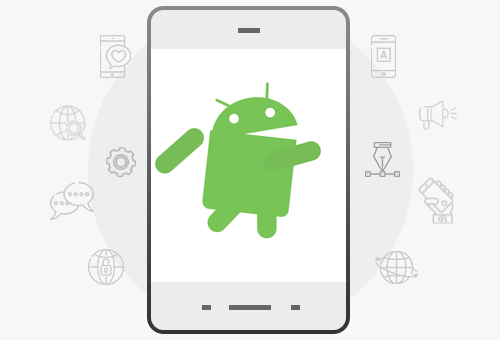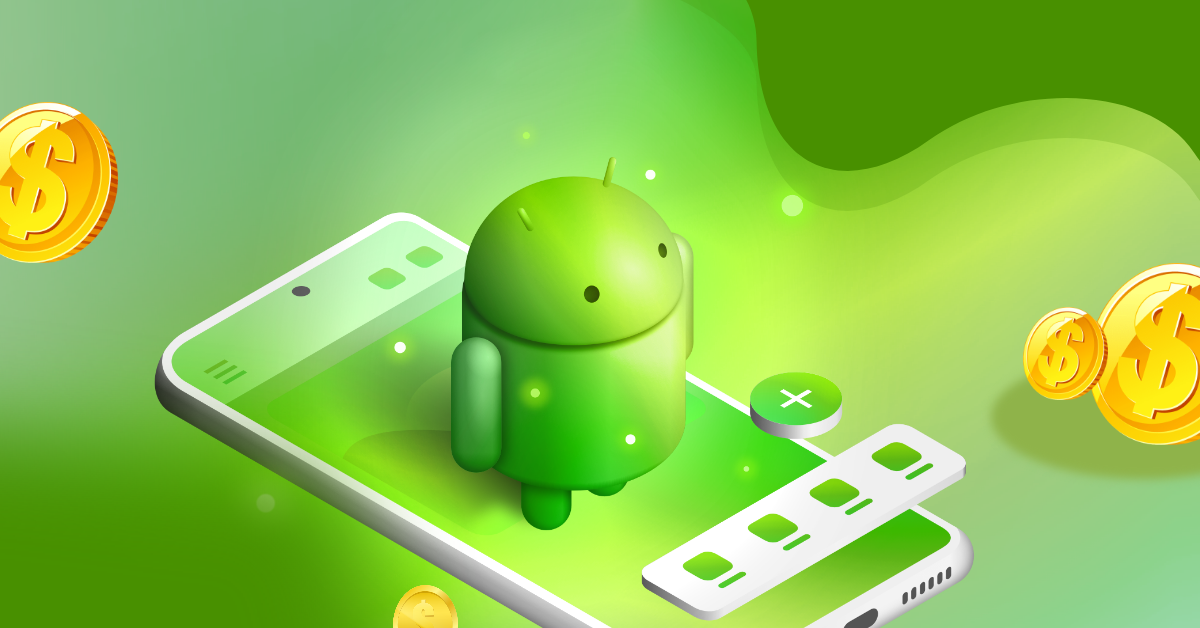Android phones have tons of apps that people use every day. These apps come in all sorts of flavors, from social media like Facebook and TikTok to health apps that track your workouts. There are so many choices, it’s hard to keep track! Do you know millions of apps on the Google Play Store and over 2.5 billion active customers globally assist this supremacy?
However, with such a lot of competitors, how can your software differentiate itself? Understanding the Android development surroundings is fundamental to locating the solution. If you are someone who is wondering about Android app development costs but not getting the answers with detailed versions, this blog is for you.
This blog will serve as your road map as you navigate the complexities of features, layout, and capability to create an app that 10 million users will love and download.
Quick Summary
This comprehensive manual explains the cost of developing an Android app. It explores factors influencing costs, including complexity, capabilities, and sources. The author also provides insights into budgeting strategies and suggestions for optimizing fees without compromising high quality.
What Is The Android App Development Cost 💰?
Numerous variables may cause a vast range in the cost of Android app development. This is a comprehensive summary of the charge levels for developing Android apps, along with a table:
| Complexity Level | Estimated Cost |
| Simple | $8,000 – $15,000 |
| Moderate | $15,000 – $25,000 |
| Complex | $25000 – $30,000+ |
Depending on the app’s features and complexity, the average Android app development cost in the USA can vary from $8,000 to $30,000 or greater. Below is a summary of the approximate Android app development cost:
1. Simple Apps
Apps like lifestyle or simple application apps typically cost between $8,000 and $15,000 to design. They have an easy user interface and a limited feature set.
2. Moderate Apps
Custom Android app development with additional modern features, including in-app purchases, social integration, or API interfaces, can cost anywhere from $15,000 to $25,000.
3. Complex Apps
Complex Android app development costs $30,000 or more to design and might have capabilities like augmented reality, system learning, or real-time records synchronization. These applications are frequently named for unique tools and technology in addition to a more big Android app development company.
Remember that these are the most effective figures and that the actual Android app development cost can fluctuate depending on some of the variables, inclusive of:
- App Complexity
- Platform Features
- User Interface and Design
- Integration with Third-Party API or Services
- Testing and Quality Assurance
- Deployment and Maintenance
- Developer Expertise and Location
- Platform Fragmentation and Device Compatibility
It’s advisable to speak with a pro progressive web apps development company or freelancers who can evaluate your needs and provide a radical cost breakdown in order to attain a unique quote.
8 Powerful Factors That Impact The Android App Development Cost
Now that you know the Android app development cost, let’s take you on the journey of 8 factors that powerfully affect the estimated cost. Here’s a guide that has everything with quite significant tables and briefs that will tell you a lot about the cost to build an Android app:

1. App Complexity:
| Complexity Level | Estimated Cost |
| Simple | $8,000 – $15,000 |
| Moderate | $15,000 – $25,000 |
| Complex | $25000 – $30,000+ |
One of the primary factors of cost to build an Android app is its complexity. While complicated apps with rich capabilities, integrations, and customizations may cost a good deal more, simple apps with basic capabilities generally cost much less. The certificate of complexity influences the amount of time wanted for React native development, the use of precise tools and frameworks, and the requirement for an Android app development company.
2. Platform Features:
| Feature | Estimated Cost |
| Basic | $2,000 – $5,000 |
| Intermediate | $5,000 – $7,000 |
| Advanced | $7,000 – $10,000+ |
The cost to create an Android app is significantly impacted by the precise capabilities and functionality wanted. While sophisticated functions like augmented reality, machine learning, and real-time statistics synchronization can appreciably boost the complexity and cost to create an Android app of the challenge, simple features like user identity, push notifications, and in-app payment are typically less steeply-priced.
3. Design and UI/UX:
| Design Complexity | Estimated Cost |
| Simple | $2,000 – $5,000 |
| Moderate | $5,000 – $8,000 |
| Intricate | $8,000 – $12,000+ |
The mobile app development cost may be significantly stimulated via its design and user interface (UI/UX). While tricky, custom-designed user interfaces with rich animations and interactions can demand a quantity of extra development time and assets, easier, primary designs are typically much less highly priced. It’s highly recommended that you connect with the best Android app development company.
4. APIs and Integration:
| Integration Level | Estimated Cost |
| Basic | $2,000 – $4,000 |
| Moderate | $4,000 – $6,000 |
| Advanced | $6,000 – $10,000+ |
Another factor that affectedly influences the cost to develop an Android app is API integrations. Including third-party APIs, offerings, or different structures in development would increase complexity and Android application development cost.
While sophisticated integrations requiring several APIs, real-time facts synchronization or custom backend development can dramatically improve the task’s overall cost, primary integrations, such as connecting to a single API, don’t highly increase the cost to build a mobile app.
5. Testing and Quality Assurance:
| Testing Scope | Estimated Cost |
| Basic | $2,000 – $4,000 |
| Comprehensive | $4,000 – $6,000 |
| Extensive | $6,000+ |
Careful checking out and QA are necessary to guarantee the dependability and functionality of an Android application. Comprehensive trying out, which includes user acceptability testing, maintenance, and performance checking out, can considerably increase the time and help efficiently calculate Android app development cost.
Basic checking out, such as unit checks and purposeful checks, is commonly less priced. Especially for complex apps or excessive-features packages, significant trying out can pressure up development costs even similarly.
6. Deployment and Maintenance:
| Deployment and Maintenance | Estimated Cost |
| Basic | $1,000 – $3,000 |
| Moderate | $3,000 – $5,000 |
| Advanced | $5,000+ |
The cost to develop an Android app is associated with publishing costs at the Google Play Store, and maintaining it up to date over time may have an impact on the Android app development cost.
Your Android app development company will first submit software programs, and minor improvements are examples of simple deployment and application maintenance and support, which are usually less-priced.
However, superior necessities like non-stop overall performance monitoring, security updates, and feature enhancements can substantially grow the project’s continuing cost.
7. Developer Expertise:
| Developer Expertise | Estimated Cost |
| Junior | $10 – $15 per hour |
| Mid-level | $15 – $28 per hour |
| Senior | $28 – $30+ per hour |
The Android app development cost may be substantially impacted by the diploma of ability and experience possessed by means of the cost to hire an Android app developer running on a task.
While hire Android app developers or choosing the best Android app development company with specific understanding and sizeable experience can fee better hourly prices but frequently supply better-high-quality work greater correctly, junior developers, even as frequently much less high priced, may also require more time and tracking to carry out jobs.
8. Platform Fragmentation:
| Fragmentation Level | Estimated Cost |
| Low | $2,000 – $4,000 |
| Moderate | $4,000 – $7,000 |
| High | $15,000+ |
The many Android versions and display sizes may cause the Android platform to be fragmented, which may make development more difficult and expensive. While apps that have to support a huge variety of devices and versions may cost extra to build, check, and optimize, those made for a small number of devices and Android variations can be less expensive.
How To Reduce The Costs of Developing an Android App?
Many of you must be wondering if there’s a way to reduce the Android app development cost. To help you in this, we have compiled a few strategies with estimated percentages of reduction that you can perform on your own to reduce the cost of Android app development.

1. Prioritize App Features
When building an Android application, it’s vital to decide which factors are essential to the app’s operation and user interface. Avoid the urge to incorporate every function in the beginning, considering that this can add a whole lot of extra money and time to the development system and leading Android app development company support.
| Strategy | Estimated Cost Reduction |
| Prioritize essential features | 10-20% |
| Develop an MVP | 15-25% |
| Use agile development | 10-20% |
| Eliminate unnecessary features | 5-15% |
Strategies to Reduce Cost:
- To identify the maximum vital features and realize user needs, conduct in-depth marketplace research.
- Make a minimum feasible product (MVP) with simply the most basic capabilities, after which upload extra features little by bit in reaction to user feedback.
- To iterate swiftly and efficaciously at the same time as focusing on offering the maximum valuable capabilities first, practice agile development methods.
- Work carefully with the Android application development company to find and eliminate any scope or extraneous capabilities.
2. Leverage Cross-Platform Development
The cost to develop an Android app can increase dramatically if it’s designed for multiple platforms, like iOS and Android. However, cross-platform development equipment and frameworks can reduce this cost, allowing you to write code once and run it on multiple platforms.
| Strategy | Estimated Cost Reduction |
| Use cross-platform development framework | 20-40% |
| Leverage shared codebase | 15-25% |
| Optimize platform-specific features | 5-15% |
| Utilize pre-built components and libraries | 10-20% |
Strategies to Reduce Cost:
- Select a pass-platform development framework that meets your needs, which includes Xamarin, Flutter, or React Native.
- To reduce effort duplication, use codebases and shared components among platforms.
- Make excellent use of APIs and platform-precise competencies to provide an easy user experience.
- To gain access to pre-constructed additives and libraries, utilize the community and environment surrounding the cross-platform framework of your choice.
3. Outsource Development Tasks
The total cost to develop an Android app developer can be reduced if you hire Android app developers from different regions to do specific development work. If you hire Android app developers and utilize this approach, you can take advantage of expert expertise and decrease Android app development costs.
| Strategy | Estimated Cost Reduction |
| Outsource non-core development tasks | 20-40% |
| Leverage lower labor costs in certain regions | 15-25% |
| Establish clear project requirements and communication | 5-15% |
| Implement quality control measures | 10-20% |
Strategies to Reduce Cost:
- Determine whether basic development tasks—like UI/UX layout, backend programming, or high-quality assurance—can be outsourced.
- Investigate and investigate reliable outsourcing android app development company in step with parameters which include rate, friendly, and communication.
- To ensure efficient cooperation, actually outline experience requirements, time limits, and channels of communique.
- Take robust, satisfactory manipulation methods to assure that the work this is outsourced satisfies your requirements.
Read More: Social Media App Development Cost
4. Utilize Open-Source Libraries and Frameworks:
A big community of open-supply libraries and frameworks for Android can be used to expedite development and cut costs. You can save money and time by utilizing these pre-built additives instead of building similar functionalities from the floor up.
| Strategy | Estimated Cost Reduction |
| Leverage open-source libraries and frameworks | 15-30% |
| Evaluate quality and community support | 5-15% |
| Customize open-source components as needed | 10-20% |
| Contribute back to the open-source community | 2-5% |
Strategies to Reduce Cost:
- Look for and locate open-supply frameworks and libraries that meet the needs of your utility.
- Examine the open-supply tools’ documentation, satisfaction, and network guide in splendid factors previous to integration.
- To meet the specific necessities of your app, combine and adjust the open-source components as vital.
- Return the favor by way of sharing any modifications or bug fixes you’re making with the open-supply community.
5. Automate Testing and DevOps
Sturdy testing and DevOps method can greatly expedite the development system, resulting in financial savings. Manual testing and remodeling may be minimized by using automated testing and continuous integration/deployment to assist in locating and connecting issues early.
| Strategy | Estimated Cost Reduction |
| Adopt test-driven development (TDD) | 10-20% |
| Implement continuous integration and deployment | 15-25% |
| Use cloud-based testing platforms | 5-15% |
| Optimize DevOps infrastructure and toolchain | 10-20% |
Strategies to Reduce Cost:
- Implement automated unit, integration, and user interface (UI) testing and use take a look at-driven development (TDD) methodology.
- To automate the development, take a look at deployment strategies put into effect channels for non-stop integration and deployment.
- Device compatibility testing can be made more green by making use of cloud-primarily based trying out systems and equipment.
- Optimize the DevOps toolchain and infrastructure to lower manual intervention and growth performance.
6. Optimize App Size and Performance
If you hire dedicated developers, you must know that reducing the general development and maintenance costs can be completed by optimizing the app’s performance and size. Improved user revel and less technical aid are the effects of multiplied performance, at the same time as smaller apps download and update extra speedy.
| Strategy | Estimated Cost Reduction |
| Optimize app size | 5-15% |
| Implement performance optimization techniques | 10-20% |
| Utilize Android-specific features and best practices | 5-15% |
| Continuous performance monitoring and optimization | 5-10% |
Strategies to Reduce Cost:
- Examine and reduce the application’s size by using code obfuscation, eliminating extra dependencies, and optimizing properties.
- Use overall performance-improving techniques, which include memory management, community optimization, and code profiling.
- Use excellent practices and functions specific to Android, such as hardware acceleration, history offerings, and lazy loading.
- Keep an eye on the app’s performance and make changes relying on analytics and user input.
7. Leverage Existing App Frameworks and Templates
You can use pre-built app frameworks and templates to store time and effort while developing the app’s vital capabilities. These pre-built answers reduce the effort and time desired for development due to the fact they regularly comprise necessary functionalities and user interface factors.
| Strategy | Estimated Cost Reduction |
| Use existing app frameworks and templates | 15-30% |
| Customize the framework or template | 10-20% |
| Integrate with backend and data sources | 5-15% |
| Maintain and update the framework or template | 5-10% |
Strategies to Reduce Cost:
- Look into and determine properly-liked app frameworks and templates that meet your utility needs.
- Tailor the selected framework or template to the capability, user experience, and branding of your app.
- Connect the template or framework to your specific records sources and backend.
- The framework or template ought to be up to date and maintained as essential to house platform modifications and new specifications.
8. Leverage Low-Code/No-Code Platforms
Platforms that require little or no coding have emerged as a sensible preference for creating Android apps quicker and at a decrease in Android app development cost. With the help of these platforms’ pre-built additives and visible development tools, even non-technical individuals can create and run apps.
| Strategy | Estimated Cost Reduction |
| Use a low-code or no-code platform | 20-40% |
| Leverage pre-built components and integrations | 15-25% |
| Utilize visual development tools | 10-20% |
| Reduce ongoing maintenance and updates | 5-15% |
Strategies to Reduce Cost:
- Determine which low-code or no-code platform best fits your software’s wishes and the talents of your Android app development company.
- To accelerate Android app development, take advantage of the platform’s pre-built user interface factors, database integrations, and deployment picks.
- Prototype and iterate quickly on the app’s layout and capabilities using the visible development technologies provided by the platform.
- By employing a low-code or no-code platform, you can replace and preserve the hybrid app development while saving cash on continuing development costs and technical information.
By implementing these techniques, you could significantly reduce the cost of Android app development while still providing your users with a superb, feature-rich utility.
Android App Development Cost – Industry Specific
An Android app development cost may vary substantially based on the industry, the app’s complexity, and the precise features and capabilities which can be wanted. The regular cost to build an Android app throughout various industries is broken down as follows. However, it is suggested that we connect with the Indian-based development team to get affordable Android app development costs in India.
| Industry | Average Cost Range |
| Retail and E-commerce | $8,000 – $25,000 |
| Healthcare | $8,000 – $28,000 |
| Finance and Banking | $8,000 – $30,000 |
| Media and Entertainment | $8,000 – $31,000 |
| Education and eLearning | $8,000 – $25,000 |
| Logistics and Transportation | $8,000 – $28,000 |
| Real Estate | $8,000 – $23,000 |
| Travel and Hospitality | $8,000 – $30,000 |
It is essential to consider that those are the most straightforward approximate figures of the cost to build an Android app, and the very last charge may fluctuate based totally on the particular needs, the intricacy of the app, the hire of mobile app developers, and other factors. Working with a sincere Android app development company is cautioned if you want a more significant and precise Android app development cost.
How Can We Help?
Hopefully, you liked this blog, and now you know how much Android app development costs. Navigating the average cost to build an Android app calls for careful attention to things like complexity, features, and developer know-how.
Look for Android app developers for hire, like Dev Technosys, which offers tailor-made solutions to suit numerous budgets. They ensure clients receive splendid apps that power commercial enterprise boom and maximize ROI inside the competitive digital view.
So, if you want to build an Android app, contact our experts and start building your success step by step.
Frequently Asked Questions
1. What Are the Benefits of Investing in Android App Development?
Investing in Android app development offers extensive marketplace attainment, numerous monetization alternatives, scalability, and integration with Google offerings, improving business visibility and revenue capability.
2. Why You Should Choose Us For Android App Development Cost?
Choose us for affordable Android app development cost know-how, timely delivery, personalized solutions, and a track record of hitting initiatives and user objectives.
3. How Can You Monetize Android App Development?
Monetize Android app development through in-app purchases, ads, subscriptions, freemium fashions, sponsorships, affiliate advertising, and marketing, or promoting digital goods or offerings in the app.
4. How To Upload An App To Google Play Store?
To add an app to Google Play Store, you need to hire mobile app developers to proceed with the steps. Create a developer account, put together your app in line with recommendations, and follow the submission method through the Google Play Console.
5. How Much Does It Cost To Upload an App to Google Play Store?
The cost to upload an app to Google Play Store includes a one-time fee of $25 for a developer account. There are no additional expenses for uploading or updating apps.






























